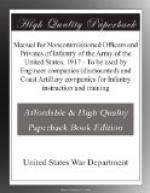The best fire for individual cooking is a small, clear one, or, better yet, a few brisk coals. To make such a fire, first gather a number of sticks about 1 inch in diameter. These should be dry. Dead limbs adhering to a tree are dryer than those picked up from the ground. Split some of these and shave them up into kindling. Dig a trench in the ground, laid with the wind, about a foot long, 4 inches wide, and 6 inches deep. Start the fire in this trench gradually, piling on the heavier wood as the fire grows. When the trench is full of burning wood, allow it a few minutes to burn down to the coals and stop blazing high. Then rest the meat can and cup over the trench and start cooking. Either may be supported, if necessary, with green sticks. If you can not scrape a trench in the soil, build one up out of rocks or with two parallel logs.
The following recipes have been furnished from the office of the Quartermaster General, United States Army:
Coffee.—Fill the cup two-thirds full of water and bring to a boil. Add one heaping spoonful of coffee and stir well, adding one spoonful of sugar if desired. Boil five minutes and then set it to the side of the fire to simmer for about 10 minutes. Then, to clear the coffee, throw in a spoonful or two of cold water. This coffee is of medium strength and is within the limit of the ration if made but twice a day.
Cocoa.—Take two-thirds of a cupful of water, bring to a boil, add one heaping spoonful of cocoa, and stir until dissolved. Add one spoonful of sugar, if desired, and boil for five minutes.
Chocolate.—Take two-thirds of a cupful of water, bring to a boil, add a piece of chocolate about the size of a hickory nut, breaking or cutting it into small pieces and stirring until dissolved. Add one spoonful of sugar, if desired, and boil for five minutes.
Tea.—Take two-thirds of a cupful of water, bring to a boll, add one-half of a level spoonful of tea, and then let it stand or “draw” for three minutes. If allowed to stand longer the tea will get bitter, unless separated from the ten leaves.
MEATS.
Bacon.—Cut slices about five to the inch, three of which should generally be sufficient for one man for one meal. Place in a meat can with about one-half inch of cold water. Let come to a boll and then pour the water off. Fry over a brisk fire, turning the bacon once and quickly browning it. Remove the bacon to lid of meat can, leaving the grease for frying potatoes, onions, rice, flapjacks, etc., according to recipe.
Freshmeat_ (to fry).—To fry, a small amount of grease (one to two spoonfuls) is necessary. Put grease in the meat can and let come to a smoking temperature, then drop in the steak and, if about one-half inch thick, let fry for about one minute before turning, depending upon whether it is desired it shall be rare, medium, or well done. Then turn and fry briskly as before. Salt and pepper to taste.




